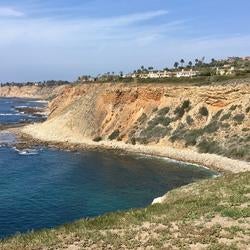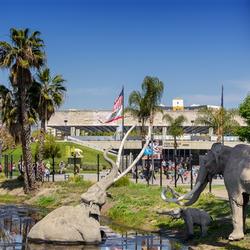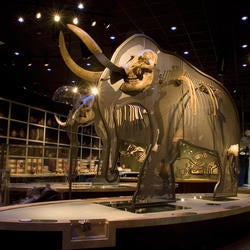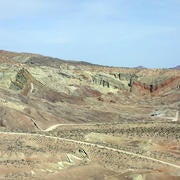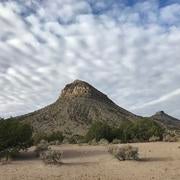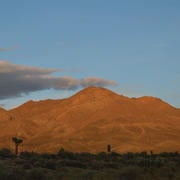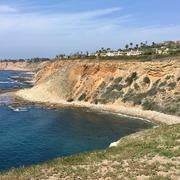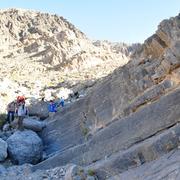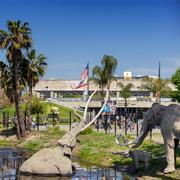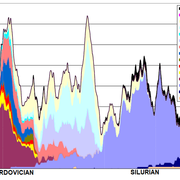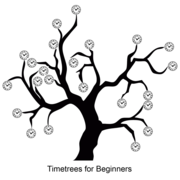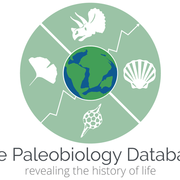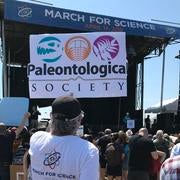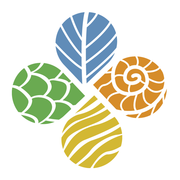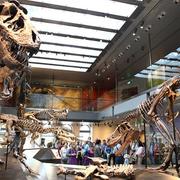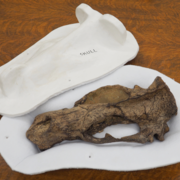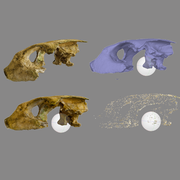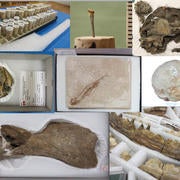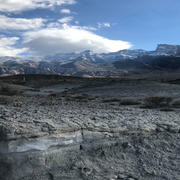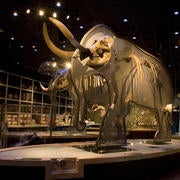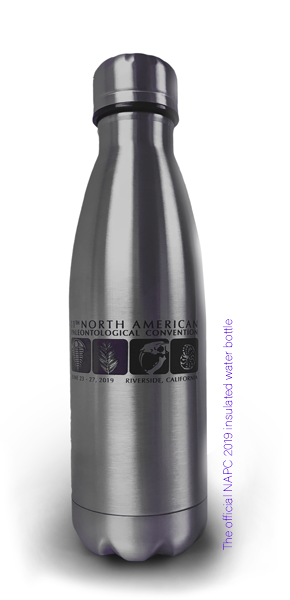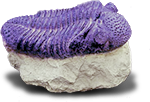There will be pre-meeting field trips beginning June 22 to June 23. Mid-meeting will offer the largest selection of activities to choose from on June 25. Choose between a workshop or field-trip. After the conference, there are several more involved trips that span over a number of days beginning June 27 and ending July 2. Please scroll down or click one of the indicated timeframes above to see more information.
PRE-MEETING FIELD TRIPS
The middle Miocene in Southern California: Mammals, environments, tectonics of the Barstow, Crowder, and Cajon formation
The Mojave Region preserves a rich Miocene mammal-fossil record that formed during a time of significant tectonic activity and climate change. We will visit exposures of Crowder, Cajon Valley, and Barstow formations to look at the evolution of three different sedimentary basins through the middle Miocene. Participants will learn how depositional environments and habitats changed through time in relation to tectonics and climate and how they influence patterns of mammal diversity and biostratigraphy.
Leaders: Katharine Loughney, Tara Smiley
Number of Participants: 25 max
Single day trip: June 22
Cost: $85.00
Extinction events and biodiversification in the Cambro-Ordovician of the eastern Basin and Range
This trip will examine classic Cambrian-Ordovician outcrops in the scenic Basin and Range country of eastern Nevada and western Utah. The focus will be on biomere-type extinction events and associated environmental perturbations and on the ultimate drivers of the Great Ordovician Biodiversification Event.
Leaders: Jonathan Adrain and Seth Finnegan
Number of Participants: 8-18
Dates: June 18-22
Cost: $640.00
Ediacaran-Cambrian transition of the southwestern USA
This field trip will explore the stratigraphy, paleoenvironment, paleobiology, and paleoecology of Neoproterozoic-Cambrian successions of southeastern California and southwestern Nevada. Participants will see soft-bodied fossil assemblages, as well as some of the earliest regional biomineralizing fauna and trace fossil assemblages, spanning the upper Ediacaran through the early stages of the Cambrian Explosion.
Leaders: Emmy Smith and Lidya Tarhan
Number of Participants: 5-17
Dates: June 19-22
Cost: $700.00
MID-MEETING FIELD TRIPS & WORKSHOPS
FIELD TRIPS
Paleontology of the Palos Verdes Peninsula
This field trip will examine the unique geology and Neogene paleontology of the Palos Verdes Peninsula. Participants will be able to observe evidence of faulting, volcanism, landslides, and observe rich Pleistocene marine invertebrate faunas, Miocene whale fossils, and possibly modern mammals and marine invertebrates.
Leaders: Austin Hendy, Jorge Velez-Juarbe
Number of Participants: 9-25
1 Day: June 25
Cost: $65.00
Early low tide visit to Crystal Cove State Park, free time in Laguna Beach, and Newport Pleistocene terrace
Spend an early morning low tide at Crystal Cove State Park enjoying the tide pools with biologist Doug Eernisse and then take a leisurely beachside self-guided tour on the geology and paleontology of the Miocene Monterey formation.
Leaders: Doug Eernisse
Number of Participants: 7-24
1 Day: June 25: 5:30 am to 4 pm
Cost: $65.00
Alf Museum and La Brea Tar Pits and Museum
Day trip to the collections of the Page Museum at the La Brea Tar Pits and the Raymond Alf Museum of Paleontology, home of extensive vertebrate collections from the Mesozoic-Recent.
Leaders: Andrew Farke and Emily Lindsey
Number of Participants: 55-110
1 Day: June 25
Cost: $65.00
WORKSHOPS
Numerical Biochronology- HUB 260
Hands-on application to real Paleozoic data sets will explore a range of options in the CONOP (CONstrained OPtimization) software, written for Windows (XP, 7, 10) 32-bit and 64-bit operating systems (or Windows emulation on Mac computers). Course notes, the CONOP program and data-manager, manuals and sample datasets will be provided to all participants. CONOP conducts brute-force, trial-and-error searches that employ a simple physical analogy rather than esoteric mathematics. We will use it to mimic the logic of several different seriation programs. Peter Sadler, UC Riverside
Timetree Methods for Beginners- HUB 268
An overview of commonly used methods and programs for constructing time trees with molecular data and calibrations from the fossil record. Mark Springer, UC Riverside
Paleobiology Database- HUB 355
This hands-on workshop will introduce participants to the scope of data stored within the PBDB, the workflow for entering information, methods for searching and downloading data, and tools and lesson plans for research and educational activities. Please create a guest account at "Join the PBDB" at paleobiodb.org before you come, and bring your laptop to the workshop. Matthew Clapham, UC Santa Cruz
Talk to your elected Officials!- HUB 379
A workshop on communication and public policy for Paleontologists: Current issues and events impinge on science in a variety of ways; some directly, some indirectly. Many scientists, including paleontologists, would like to share an informed opinion about these issues with their representatives in local, state, or national government, but may feel that they lack the necessary skills or vocabulary to do so. What are the current and pending issues? How can we be most effective in communicating our knowledge and opinions? Which approaches work well and which work less well? This workshop is intended to provide guidance on a range of options for establishing and maintaining communication with elected officials, from making an initial telephone call to visiting Washington, D.C. for an in-person meeting. Sandy Carlson, UC Davis
Digital Resources in Paleontology, Professional Development Workshop
Looking to provide your students with real data for them to examine and analyze? Struggling to engage your students with tangible examples of climate change and evolutionary processes? This workshop will provide you with freely available resources and train you in how to use them.
Workshops at the Natural History Museum of Los Angeles County
A maximum number of 25 participants for all these workshops in combination is possible.
Charge: $15 per person for lunch and transport to Riverside Downtown Station. There will be no charge for travel from Riverside to the workshop (sponsored by Metrolink) and no charge in the Museum (sponsored by NHMLAC and supporters). See drop down menu below for more information.
Essentials of Publishing Lunchtime Workshop Sponsored by the Paleontological Society & Cambridge University Press
This workshop will be from 12:00-1:00 pm on Sunday, June 23, and is free and open to all attendees.
This interactive workshop is a great opportunity to learn more about how to select a journal, prepare and submit and article to get published, as well as to network with Paleontological Society editors.
Lunchtime Workshops Sponsored by the Paleontological Society Diversity & Inclusion Committee.
These workshops are free and open to all attendees. See drop down menu below for more information.
-
Click here to find out more about the workshops at the natural history museum.
How to Make Archival Specimen Storage Jackets
Storage jackets are a great way to preserve specimens too large to fit in drawer-scale housings. The solution for fossils bound for cabinets, open shelves or even floors, these jackets are designed so that fragile specimens need never be without support during storage, study or even CT scanning. Made from archival grade materials they ensure maximum support over the long haul. In this workshop we’ll focus on Smithsonian style “clamshell” jackets made of plaster, fiberglass and polyethylene foam or polyester felt. Participants will get hands-on experience helping to make a jacket. This will involve long periods standing, potentially getting plaster on clothing, handling (with gloves!) coarse fiberglass mat. Appropriate PPE will be provided.
Photogrammetry Workshop: 3D Modeling of Holotype Specimens
Photogrammetry is advancing and becoming a major platform for surface digitizing in paleontology. Digital 3D models allow the public and researchers to visualize and interact with rare specimens that would otherwise not be accessible. The Vertebrate Paleontology department (Natural History Museum of Los Angeles County) has developed this photogrammetric project to showcase its type collection on an interactive public online platform, with the ultimate goal of increasing digital access to the vertebrate fossil collections. These 3D models of fossil holotype specimens (name bearing specimen for a new genus or species) can act as valuable resources for various educational and public outreach purposes, as well as scientific and academic research. The workshop will offer a practical overview of the methodological approaches and equipment used in photogrammetry within the context of our Holotype Specimens collection, as well as its scientific application to the curatorial process of fossil vertebrate material and for outreach purposes. Participants will be able to test different images, capture methods with a test specimen using their own cameras or smart phones, followed by a walk-through of the data processing of the model in Agisoft Photoscan. Participants will need to bring specific camera and laptop equipment them, and will need to have pre-downloaded a trial versions of appropriate software.
Wrapping and Packing Specimens for Shipment on Loan
Delicate and often irreplaceable fossil specimens are often wrapped, packed, and shipped on institutional loan to places all around the globe. Preparing a fossil for shipment involves assessing its current condition, creating long-lasting supports, and communicating best handling practices to the recipient. The techniques employed should be simple to execute so that the recipient can easily replicate the process when the fossils are returned. The materials in contact with the specimen should be inert, non-abrasive, and slow to degrade. Familiarity with the properties and applications of archival quality materials can be useful for creating barriers between the specimen and other supporting materials. Incorporating a mixture of recycled and repurposed items can also serve to further immobilize, cushion, and encapsulate specimens sent on loan. This workshop includes both lecture and hands-on components to inform participants about common mistakes to avoid and best practices to employ so that damage to specimens is mitigated. Whether you are a curator, collections manager, preparator or administrator overseeing a collections department, this workshop aims to equip people with the knowledge and skills to disseminate best practices concerning the evaluation, handling, and transfer of fossil specimens. Participants will leave with a detailed packing hand-out, references, and their packing sample.
-
Click here to find out more about the Equity, Inclusion & Diversity Workshops
For Students: Finding your community and building a support network- Monday, June 24
Finding your space and feeling at home within your professional scientific community is difficult, even more-so if you aren't part of the majority. We invite students to come get to know each other and start to build community. This lunch will feature a panel of paleontologists who speak from their own experiences as scientists with minoritized backgrounds and who offer tips and tricks for building networks for collaboration and support.
For All: Using Your Power & Privilege For Good- Wednesday, June 26
This lunchtime workshop invites people in positions of power (faculty, advisors, lab managers, and others) to build competencies and confidence for making real change in paleontology fields. The first part of this workshop leads participants in activities designed to explore and understand privilege. The second part focuses on developing practical strategies for addressing issues of diversity, equity, and inclusion in paleontology.
POST MEETING FIELD TRIPS
Miocene Fossil Lakes, Ordovician Mud Mounds and Triassic Ichthyosaurs
This trip will explore the rich Paleozoic, Mesozoic and Cenozoic fossil record of Nevada starting with Ordovician mudmounds and Triassic ichthyosaurs and moving on to Miocene fossil lakes and the modern microbialites of Mono Basin. The lake record includes lake margin fossil plants, and mammals as well as fish and insects preserved in diatomaceous lakes that were widespread in Nevada during Basin-and Range rifting.
Leader: Dick Norris
Number of Participants: 13 max
Dates: June 28-July 1
Cost: $450.00
Middle Cambrian Fossil Lagerstätten of Utah
Utah is home to four Cambrian fossil lagerstätten. This trip will visit classic sections in the House Range to explore the fossil records of the Wheeler, Marjum, and Weeks formations, and the type section of the Spence Shale member of the Langston Formation at Spence Gulch.
Leaders: Robert Gaines, Rudy Lerosey-Aubril, Julien Kimmig
Number of Participants: 10-18
Dates: June 28-Jul 2
Cost: $725.00
Tour of the Western Science Center
The collections of the Western Science Center represent one of the largest and most complete records of Pleistocene fauna in Southern California, as well as important artifacts representing the prehistoric and historic records habitation in Riverside County.
Leader: Alton Dooley, Jr.
Number of Participants: 20-40
1 Day: June 28
Cost: $70.00

